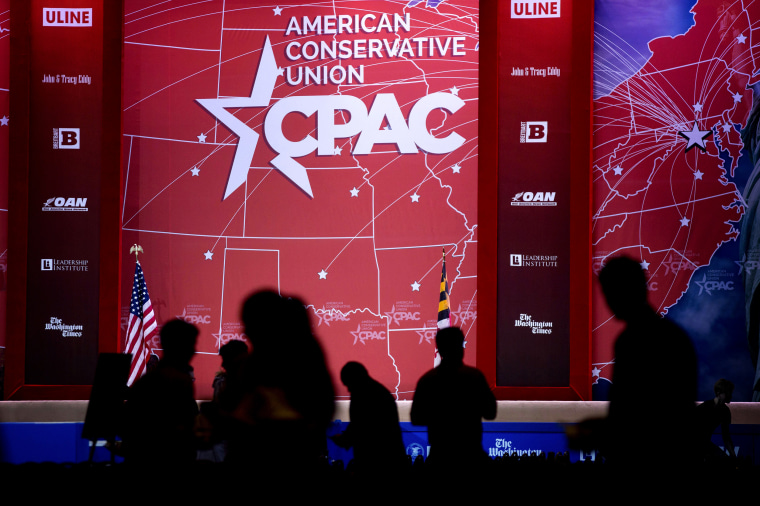The Conservative Political Action Conference, or CPAC, named its keynote dinner after the 40th president of the United States, Ronald Reagan, whose appearance at the first CPAC in 1974 marked the beginning of a yearslong political love affair.
CPAC was a showcase, and a safe space, for the boisterous Republican base that powered the Reagan revolution.
CPAC was a showcase and a safe space for the boisterous Republican base that powered the Reagan revolution: religious conservatives like Phyllis Schlafly; the anti-taxers, like Sen. Phil Gramm; and the anti-communists, like — well, everyone there. CPAC was a forum for conservative diversity, but its leadership encouraged fidelity to the core tenets of the movement.
There have always been media-bashing and fringe viewpoints at CPAC. That was part of its charm. But in 2021, the fringe is the mainstream; Fox News is sponsoring a good chunk of the proceedings, former President Donald Trump will be a keynote speaker, and there will be no policy debates.
Instead, there will be panels that directly perpetuate the "big lie" that tipped grievances and anger into violence on Jan. 6. To understand why CPAC has no hesitation about trafficking in conspiracy theories, it's useful to understand the bind that the people who run the American Conservative Union find themselves in.
I asked Ian Walters, the American Conservative Union's longtime spokesperson, why the conference features panels with titles like "Other Culprits: Why Judges and Media Refused to Look at the Evidence" or "The Left Pulled Strings, Covered it Up, and Even Admits It" or "Protecting Elections Part VI: Failed States (PA, GA, NV, oh my!)."
The election, conducted under the duress of a pandemic and in the shadow of Trump's efforts to delegitimize it, was actually considered the smoothest in American history. That is the truth; that truth, incidentally, led to Republican gains in the House and down the ballot.
Walters told me: "This is the big issue going forward. So it's forward-thinking. Are we going to allow the way that the laws were changed over the summer of 2020 — is that the new normal? Once coronavirus is done, once the pandemic is done, does that stay in place permanently? I think that's a fair question to ask and kick around."
Republicans no longer pretend that they favor making voting easy.
Walters is referring to the states, from Texas to Georgia to Pennsylvania, that changed absentee ballot rules before the election to allow more people to vote from home, alterations to procedures that bypassed their legislatures. Three justices of the Supreme Court want to clarify what powers secretaries of state might have in these cases, which seems reasonable — although Justice Clarence Thomas seems to believe there was merit to provably false claims of fraud.
Republicans have already started writing new laws to tighten absentee ballot voting in states like Georgia, calling it a matter of voter integrity. Though there is no evidence that voter integrity was compromised, it is also true that Republicans no longer pretend that they favor making voting easy. And if there is a disparate impact on already disenfranchised groups, such as Black voters, well, that's too bad.
Walters is right. That is a fair question to kick around.
But that's not the big lie. (Walters isn't a fan of that phrase, he told me.) What aren't fair — or should be condemned as unreasonable and anti-democratic — are panels that work to further undermine confidence in the integrity of the voting system by perpetuating provable untruths.
Republicans might not have benefited from the changes in the voting laws, but the difference between conceding that point, on one hand, and feeding a lie that has already sparked violence, on the other, is a line that CPAC could have drawn. Really, it's a line that CPAC needs to draw, because people who believe the lie won't listen to the media or to liberals or to President Joe Biden. CPAC is a chance to lead part of the base out of the abyss.
That's not going to happen.
"But you've got to understand," Walters told me, "we're looking for the same thing everybody else is looking at, which is whether there's belief in the results. People don't trust the results."
I get that. And I also get that CPAC doesn't have the courage to speak truth to power, especially if that power depends upon a lie. Attracting Trump, who may or may not run again but whose hunches and gripes serve as the Republican Party's governing platform, was more important.
On a less prosaic note, CPAC will be the first major forum since Jan. 6 at which conservative activists who believe the lie — or maybe pretend to believe the lie — will meet and encourage others to keep their heads up and move forward.
Walters told me that he is prepared to correct the record if speakers allege "fraud originating in Venezuela somewhere, or by Hugo Chávez," a reference to the unhinged conspiracy theory about election voting machines that Trump himself perpetuated. (Pending defamation suits against a number of conservative luminaries by one such manufacturer, Dominion, are a deterrent.)
CPAC could do one better. It could stop the lie. But it won't, because it profits too much from "stop the steal."

